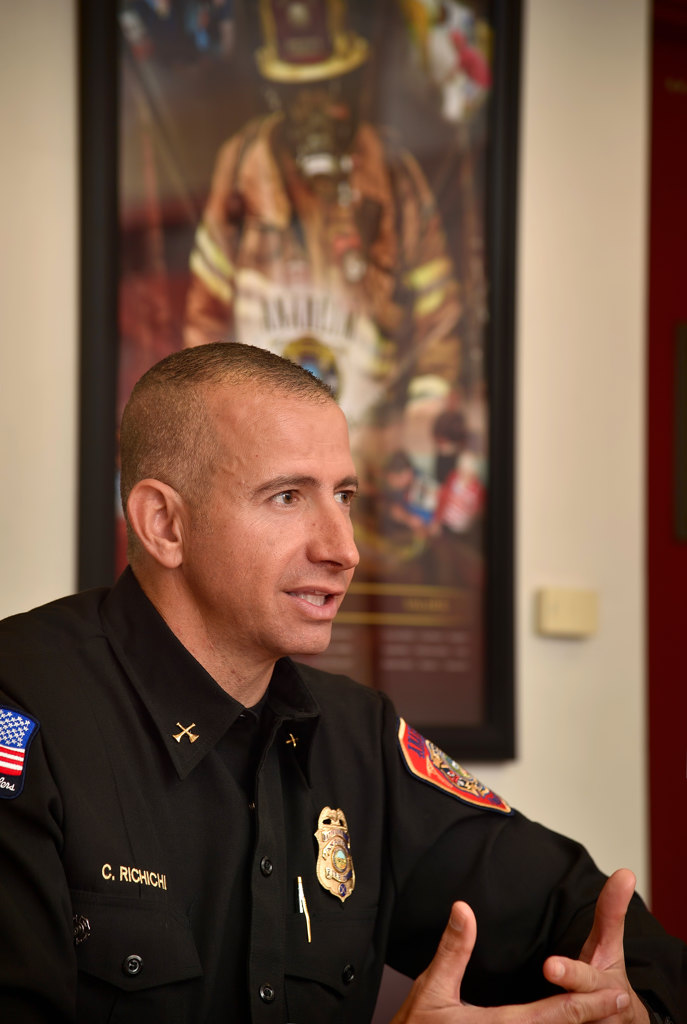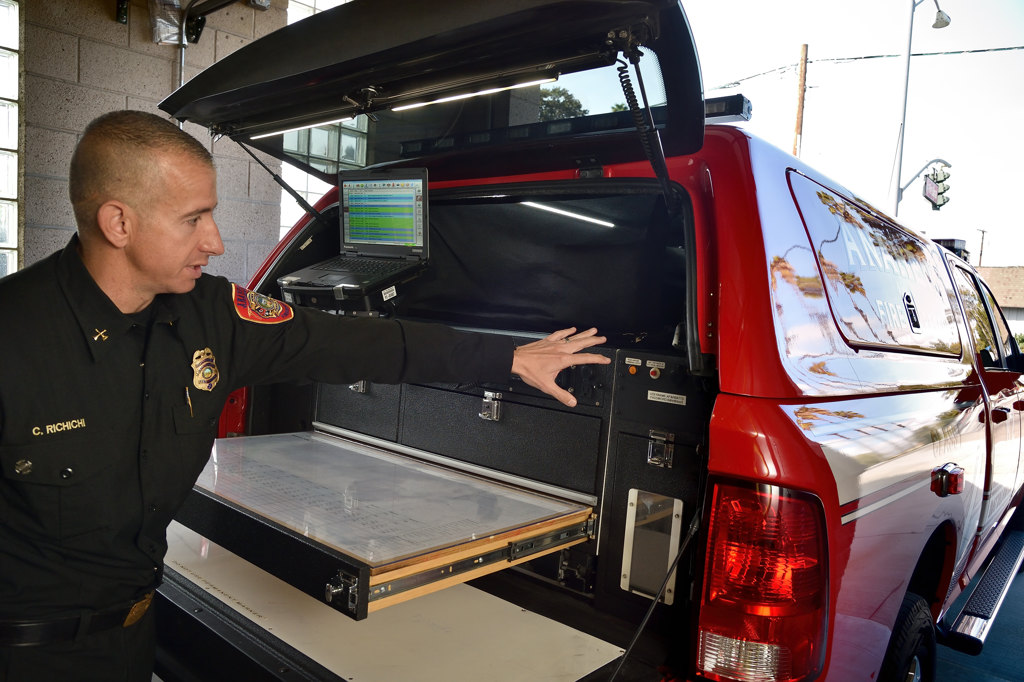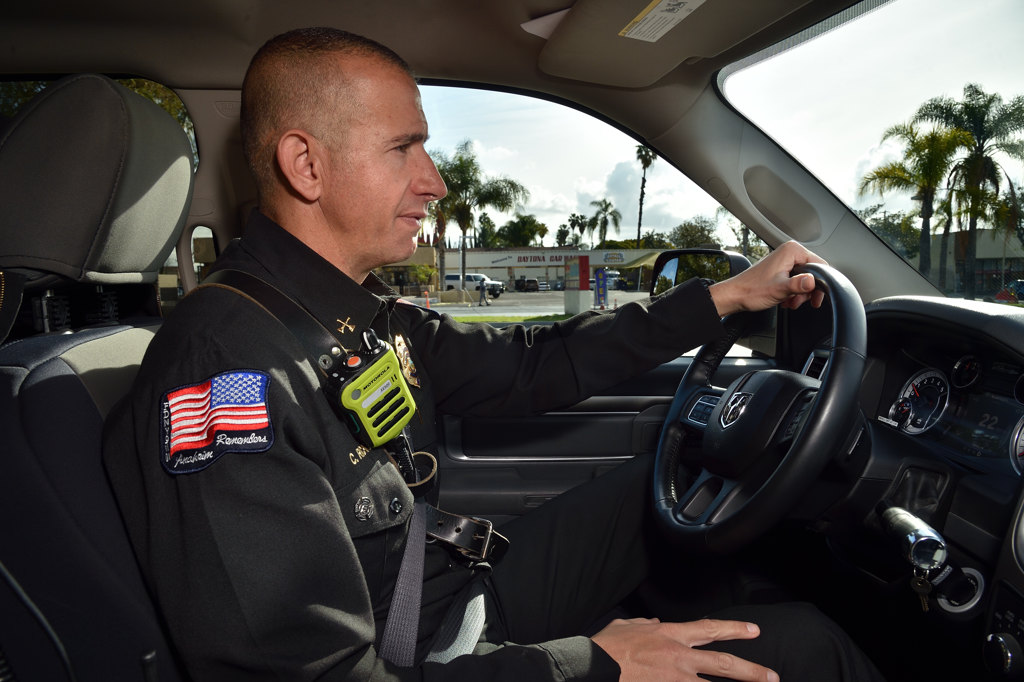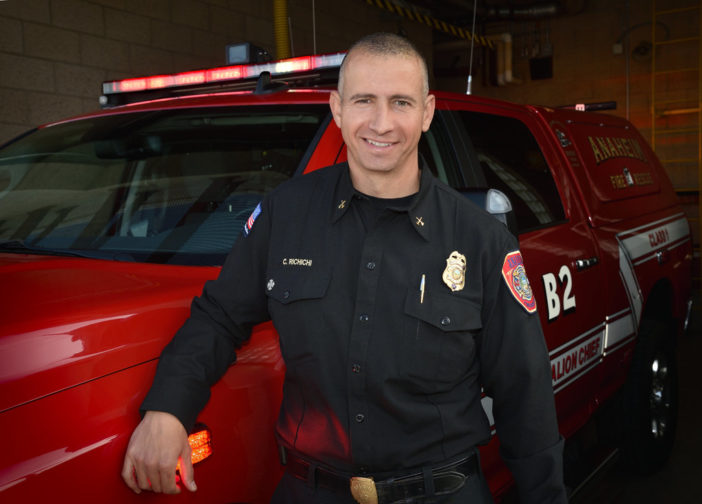The battalion chief weaves his four-wheel drive Dodge Ram through mid-morning traffic in west Anaheim as he rolls to a report of a structure fire at an elementary school.
Chris Richichi, who works out of Station 6, blasts his horn several times to get around motorists, some of whom come to a dead stop in left lanes.
Battalion chiefs don’t go out on routine medical aid calls, which account for more than 80 percent of calls for service to AF&R’s 11 stations.
Instead, Richichi and his cohorts – he is one of six battalion chiefs at AF&R, which is testing soon for two BC vacancies — only respond to big calls like structure fires and traffic collisions that typically result in fatalities or that involve multiple vehicles.
The night before, Richichi went on back-to-back calls involving multi-vehicle traffic collisions. One resulted in a fatality. It took seven AF&R firefighters about 15 minutes to extricate the dead man from his heavily damaged car, which was involved in a head-on collision.
BCs like Richichi also respond to incidents that need to be managed on a large scale, including calls involving hazardous materials or ones requiring the urban search and rescue team.
BCs also act as strike team leaders on wildfires. Last summer, Richichi spent 21 days on the Thomas Fire and 14 days on the Mendocino Complex Fire.
Once Richichi arrives at the scene of an AF&R call, he acts as an incident commander, orchestrating who needs to be where and what needs to be done.
When the structure fire call came in at 8:43 a.m. on a recent weekday, Richichi raced toward the elementary school.
Five minutes later, at 8:48 a.m., the call was cancelled.
Richichi returned to Station 6, where he lives during his shifts with his subordinates and puts out fires of another sort: looking into rumors about upcoming promotional training, making sure enough resources are available for calls when a truck or engine needs to go to the yard for repairs, scheduling upcoming training and inspections, etc.
“There’s a fine line of being a buddy, a friend, and then their boss,” says Richichi, who spent five years as a firefighter paramedic in Oceanside before joining Anaheim Fire & Rescue in 2004. He promoted to captain in 2009 and has been a BC for two years.
“I try to make it very simple: ‘Hey, just fulfill your job description,’” Richichi says of his approach toward his troops. “You fulfill your job description, and you’re not going to make me do the parts of my job that I don’t want to have to do, and that’s the disciplining.’”

Anaheim Fire & Rescue Battalion Chief Chris Richichi became interested in a career in the fire service following a family tragedy.
Photo by Steven Georges/Behind the Badge
A battalion chief acts as a facilitator between rank-and-file firefighters and higher-ups such as division chiefs and deputy chiefs and the fire chief, all of who work out of AF&R headquarters in a downtown office building.
BCs are the counterparts — sort of — of lieutenants at police agencies, although battalion chiefs work closer with their subordinates – and, obviously, live with them at work.
Since BCs only go out on big calls, they don’t interact with the public nearly as much as rank-and-file firefighters do.
“The majority of us got into this job because we want to help people; we want to make a difference in people’s lives,” says Richichi, who is 44 and married with three children: a boy, 15, a girl, 12, and a boy, 10.
“And as a paramedic, as a captain, they’re doing that,” he says. “These guys are doing that every single day. The flip side of that is with this job, I really get to leave my mark within the organization and get to leave it in a better place than when I found it. And I really get to help the rank and file with their needs.
“As a servant leader, that’s what I’m trying to do. I’m trying to really build trust, be a leader, mentor them, and help them promote within the organization. That’s an aspect I really love about this position.”
Richichi, perhaps more than most firefighters, recognizes how much impact a firefighter can have on a member of the public while on a call.
That’s because, at age 17, under tragic circumstances, he had to made a 911 call.
TWO MOTHERS
Richichi was born in White Plains, N.Y., and grew up in the Bronx. His parents separated when he was a toddler. His mother and grandmother raised him and a younger sister.
The four moved to West Covina when Richichi was in high school. His mother worked as an office manager for an orthopedic surgeon.
While a junior at West Covina High School, Richichi was at home with his grandmother, dong homework, when he momentarily left the kitchen.
When he returned, his grandmother, 76, was unresponsive in her chair. She had gone into full cardiac arrest.
“We lived probably less than a mile from a fire station; I heard (trucks and engines) every day going on calls,” Richichi recalled. “And that afternoon, I had to pick up the phone and call 911.”
Richichi, who was very close to his grandmother, was numb and devastated.
“Those guys came out and they were like angels,” he says of the West Covina firefighters from Station 71. “There’s no other way to describe it. When you’re in that situation and you pick up the phone and have to make that phone call and you hear those sirens, it’s like you just can’t wait for them to arrive.
“I remember that call like it was yesterday, and the way the captain treated me. He just kind of embraced me. He was very calming, very soothing. He got me to calm down and help with such things as telling them my grandma’s medications and her medical history.”
Unfortunately, the firefighters couldn’t revive her, and she died.
Richichi spent the next year in a haze.
When he was a senior, and trying to figure out what he wanted to do with his life, Richichi set aside his initial plans to become an architect or professional baseball player.
He recalled the firefighters who responded to the 911 call concerning his grandmother, and thought:
You know what? That’s what I want to do.

AF&R Battalion Chief Chris Richichi shows the tools available to him in the back of Battalion Chief 2, a Class 1 fire truck, that can be used to coordinate operations from the scene of a large-scale event.
Photo by Steven Georges/Behind the Badge
“I never wanted to be put in another situation where I wouldn’t know what to do again, because that’s how I felt that day,” Richichi says. “I felt helpless.”
ONE REGRET
Richichi realized a career in the fire service was his life’s calling.
He took fire science courses at Mt. San Antonio College, became an EMT, and eventually went to paramedic school.
He worked for an ambulance company and as a reserve for the La Verne and Monrovia fire departments before landing his job at the Oceanside FD.
“It was more than a job for me,” Richichi says. “There was a purpose to it.”
He adds: “At the end of the day, I have a different perspective in the sense that you never know who you’re going to impact. I don’t think the firefighters who helped me realized how they impacted me, and I’m in the position I am today because of what happened.”
Richichi says he has one regret in life.
“I never went back to that station to find out who those firefighters were.”
A NEW YAWKER
Around Station 6, Richichi is known as Mr. New York.
He’s a die-hard Yankees fan.
His wife, Jennifer, is a stay-at-home mom.

AF&R Battalion Chief Chris Richichi drives back from a reported fire at an elementary school. The call got cancelled when it turned out to be a false alarm.
Photo by Steven Georges/Behind the Badge
His oldest son, Dominick, is an explorer at AF&R who wants to become a firefighter paramedic.
Outside of work, Richichi loves to golf and travel.
At work, he could have 10 things to do on his daily calendar – and 10 other things that may come up that require immediate attention.
“This is our house,” Richichi says. “All of these stations are like our homes. The garage door breaks? We need to fix it. We get leaks, ants, all the same stuff. So all these things need to be managed and handled, too.
“I have to really trust my captains, because I can’t go to every station every day. So hopefully, my message gets across to them and with that trust in me, they’re pushing the same message to their troops.”
Richichi relishes the great responsibility of being a BC – as well as the great responsibility all his firefighters share.
“At the end of the day,” he says, “there’s nobody else we can call. We don’t have a phone number to call somebody else. We either fix it, or it doesn’t get fixed.”
 Behind the Badge
Behind the Badge



